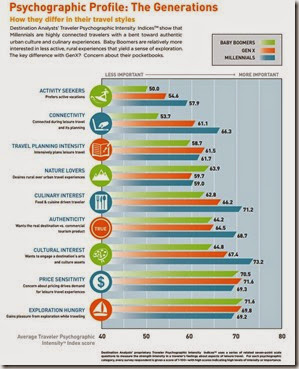Before I touch on new research supporting the importance of authentic sense of place, let me touch on one of the ironies from my four decade career as a guardian of sense of place.
It is how much time is required in that profession to defend communities from mainstream tourism interests.
Those drawn to the appeal of sense of place but then from overbuilding and lack of differentiation brought on by ubiquity, soon begin to cannibalize it instead.
Desperately demanding more and more promotional oxygen to subsidize their responsibility to fill beds and seats, they instead begin sucking away at what is meant to promote the community at large and fuel overall visitation.
During the 1970s and 1980s, it was from convention-related hotels, and meeting or event planners demanding kick-backs or subsidies or facility-driven public officials desperate to obscure deficits when public facilities were no longer warranted.
In the 1990s, it was from mega-event “big-game hunters” intent on subsidies to secure events far too large to fit or held only at times that displaced as much or more demand than they generated.
In the 2000s, my final decade, it was from mainstream events and performing arts facilities which, desperate from overbuilding hundred more than warranted, sought to monopolize attention far disproportional to their percentage of visitor potential, at the risk to less pretentious forms.
If that isn’t enough, there are always one of two elected officials impatient for returns from leveraged visitor spending, who seek to drain away promotional resources.
So why did I love my career so much?
Because communities worth loving as places to live are places people find worthy of visiting. They are the reason the vast majority of people travel away from their homes at all.
That “authenticity” must be protected and carefully nurtured even during the process of creating awareness and appeal.
Because guarding and leveraging sense of place is also incredibly worthwhile and rewarding.
But I still took time to listen very carefully to those who sought to undermine sense of place, even if intentionally.
Not only was there always a fragment of value to be gleaned but it made me think and reflect more deeply about my own assumptions and the data behind them.
As Dr. Robert Reich recently commented, “there is no better way to learn than to talk to someone who disagrees with you.”
The annual study of leisure travelers who now make up 3-in-4 visitor stays includes indices of areas of importance as well as travel style broken down by generation.
“Nature” scores above 50%, and nearly 65% for “boomers” such as me.
But “authenticity,” the desire for real destinations vs. commercial or mainstream tourism product, is more important across all generations but even more so among Millennials as is “culinary interests,” engaging in a destination’s arts and cultural assets, and “exploration.”
“Activities,” are among the least important across all generations.
For many communities, this awareness is far too late. Their sense of place and authenticity has already been hollowed out by preoccupation with mega-facilities and events, mainstream culture and arts, cookie-cutter lodging, formula stores and chain restaurants.
For communities still clinging desperately to their sense of place against the forces of homogenization, the lessons from this report and many others I’ve linked to in essays key-worded as “authenticity,” are clear:
- Focus marketing efforts on unique sense of place assets such as indigenous art and festivals, green infrastructure, historic preservation, organically evolved districts, and locally-owned stores and restaurants.
- Keep mainstream elements in their place while teaching them how to embrace the authentic characteristics of a community.
- Be ever vigilant of the dangers that come with success such as “fear of saying no,” “churn,” “unholy alliances between policy makers and powerful special interests,” and “envy.”
- Forsake those who claim “special knowledge” and relentlessly pursue critical and strategic thinking, differentiation, data and information-driven decision-making.
- Beware of the incestuous deadly sins of complacency and envy of other places.
- Eschew desecration marketing, including billboards, as well as other “yelling” forms of advertising. Generously invest in the sharing of valuable content, earned attention and respect is the most valuable.
- Religiously foster and protect distinctiveness and carefully guard against decisions that glitter but merely make a community one of many.
And always strive to listen, especially in the face of spittle, condescension, disrespect, anger, drama, exile, character assassinations, bribes, end-runs, betrayals, sycophants, demands and cabals.
There is always a tiny nugget to be gleaned. Then go shower.
Be fearless. Communities still worthy of love, still worthy of visitation, and still having a soul will always be worth fighting for.
No comments:
Post a Comment